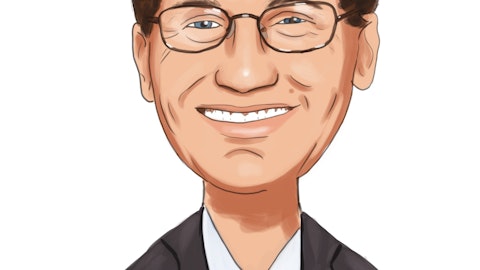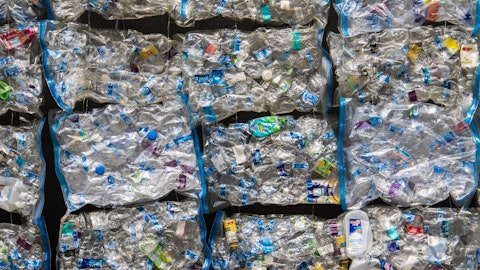Hassan Ahmed: Generally, appreciate all the disclosure you guys have given. Super helpful, particularly at this stage of the project. Just wanted to dig a bit deeper into the unit economics that you guys have presented, both in the Q4 update as well as the 2023 budget presentation. Historically, you guys would talk about pricing being sort of in the $0.90 a pound to $1 a pound range and you talk about EBITDA per pound being between $0.45 to $0.55 a pound. So suggesting EBITDA margins of 50% to 55%, right? Now as I look at the Ironton sort of EBITDA margins, you are suggesting 24 % to 25% EBITDA margins by year end, 34% ex-management fees and very cognizant of the fact that, obviously, as you guys optimize, you take it back up to close to 50%.
But I’m just trying to understand if we could focus a bit on pricing, because in the update, you are talking about a pricing assumption of $1.10 a pound. In the budget, you are talking about $1.26 a pound and saying that that is conservative. So I’m just trying to reconcile all of these things, particularly on the pricing assumption and the EBITDA per pound assumption. If you could clarify that, that would be super helpful.
Dustin Olson: There is a component on the Ironton economics early stage ramp versus new long term view slide, okay? There is a component under COGS called off take breakdown, okay? And what that means is that is the cost to transfer from railcar to truck and boxes. What we didn’t show in the revenue is that cost is included in revenue as well, okay? So it’s a bit of a recycle stream in the overall economics. We will not bear the cost of the off take breakdown that will be translated to the customers. And so that dollar $1.26, $1.28 that we referenced is really artificially high by like the $0.18 that we have built into it for breakdown in bulk. Now with respect to the $0.90 to a $1 discussion, that is highly dependent on polypropylene price.
And so we have always said around a buck to a buck 10, I think, on pricing for the overall product. And what we expect to find over time is, A, as the polypropylene price goes up, obviously, we will make more money in Ironton. But also, as we become more and more skilled at selling our product to value customers, we will see the smaller end tail of our curve continue to bring the revenue line up as well. And that’s where I guess it really brings two slides into focus. One is the Formerra relationship. We believe that will be highly beneficial for both of us but also the product quality slide. I mean, if you look at the product quality slide, Hassan, in detail, I mean, there are substantial benefits that we bring with our product that quite frankly today are not getting valued in the market.
People are not paying us extra because we have lower odor than virgin, people are not paying us extra because we have color ability. So across these four components, I mean, when the market sees what we can do with this product and sees what our quality really is and starts to show it and use it into their applications, we think that the excitement around what we’re doing is going to grow and grow. And so we’re extremely excited about the future of product pricing on our side, because we just see a superior product that we’re about to bring to the market. The other thing, Hassan, just to say on product pricing that personally I’m very excited about, and this really depends region to region. We see this as we start to develop relationships in Japan and Korea and Europe.
But there are varying levels of value placed on sustainability, carbon credits, greenhouse gas reduction, fossil fuel credits, all of these things that we perform very well at. And right now, our product pricing does not show that. So I think there’s a lot of upside. We’re obviously very excited about it, but I think there’s a lot of upside to the future of the product pricing for our company.
Hassan Ahmed: And as a follow up on the feedstock side of things, I mean, beyond Ironton, can you talk a bit about how your discussions are going with regards to costs associated with feedstock, as well as the availability of feedstock, and this is, like I said earlier, beyond Ironton?
Dustin Olson: Remember, in the Augusta project, we have included sort capability into the feed prep, which we view as very important to our overall strategy, not only so that we can have access to higher volumes of feed but also so we have access to cheaper volumes of feed. So from that perspective, we certainly are adding a component to feedstock, let’s say, performance, which will be enhanced through the Augusta project. I guess the other piece that I would remind the team on and we’re starting to see it is we will buy feeds that other people cannot buy. We don’t care about color, we don’t care about odor, we don’t care about the same types of contaminants that other people care about. So that puts us into a position where we can buy better than others.
And we’re really not even exercising that muscle yet. I mean, we are now running the prep facilities in Ironton. We’re learning how to buy, we’re getting flowed through the plants, we’re learning how to run the equipment in Ironton, the grinders, the shredders, the wash equipment, and all of that is going to build muscle that allows us to buy better in the future.
Operator: That concludes today’s Q&A session. I would like to turn the call back over to Dustin for closing remarks.
Dustin Olson: Thank you so much for the time today. As you can imagine, the last four to six months have been very busy for us. We’ve had a lot of speed bumps as we said in the prepared remarks that we have navigated through. And I just want to give another shout out to the PureCycle team and our partners. I mean, this has been a tremendously challenging period of time through which we have moved on. As we say, we are now in control of our own destiny and we are ready to move forward and bring recycling to the world. And I’ll end with this, the last 10 years, they have resulted in this moment. We’re thankful for your support, we’re confident in our position and we could not be more optimistic about our future. So thank you all for being patient and sticking with us and we can’t wait to talk to you one-on-one or at the next quarterly. Thank you all.
Operator: This concludes today’s conference call. Thank you for your participation. You all may disconnect. Enjoy the rest of your day.
Follow Purecycle Technologies Inc. (NASDAQ:PCT)
Follow Purecycle Technologies Inc. (NASDAQ:PCT)
Receive real-time insider trading and news alerts





